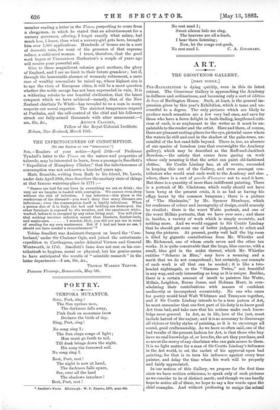THE WOMEN'S EMIGRATION SOCIETY.
[TO THE EDITOR OF THE " EPECTATOR.1
SIR,—While in London a year or two ago, I had the honour of assisting in the formation of a society under the above name. One aim was to find an outlet for the rapidly increasing number of educated, but more or less destitute, women all around. As I bad only recently returned from a visit to this colony, I strongly recommended its unique advantages to the society, feeling sure that in the New Zealand homes might be found numerous openings for the class of helpers embraced in its operations. One or two gentlemen of colonial experience, among whom was the Agent-General for New Zealand, Sir Julius Vogel, demurred to my recommendations, assuring me that educated women were not an eligible class of emigrants. I heard what these gentlemen had to say, but retained my own opinion on the subject. I have now been a year here pushing my in- quiries, and the result is a confirmation of my original convic- tion. There is, indeed, a growing feeling in New Zealand that one of her deepest needs just now is an immigration of a supe- rior class of women-helps. This feeling has just found emphatic expression in the formation of a " Women's Immigration Society " in the important city of Auckland. I doubt not similar societies will be formed throughout the whole colony. New Zealand's necessities may thus become once more England's opportunity. When, a few years ago, agricultural labourers were somewhat of a drug in the English market, we sent a few thousand of them over here, to the twofold advantage of themselves and those who remained behind. I have had the pleasure of meeting with some of these men in their new homes, and the stories of their successes would read like a chapter of romance. Adjoining the very house in which I now write, is an orchard belonging to one of those incomparable agriculturists—for it is a fact patent to every traveller that the English agricultural labourer is the finest article of the kind to be met with—who, instead of vege- tating in an English shire at 12s. a week, is owner of a fruit and vegetable farm bringing him in at least £5 a week all the year round. And so it may be with the sadly ill-paid and badly-placed middle-class women of English society. I re- member reading a letter in the Times, purporting to come from a clergyman, in which he stated that an advertisement for a nursery governess, offering, I forget exactly what salary, but much less, I know, than what a nursery-girl gets here, brought him over 1,000 applications. Hundreds of homes are in a sort of domestic ruin, for want of the presence of that supreme refiner, a cultivated woman. I trust, therefore, that the good work begun at Viscountess Harberton's a couple of years ago will receive your powerful aid.
Give to these magnificent colonies good mothers, the glory of England, and I see no limit to their future grandeur ; but if, through the lamentable absence of womanly refinement, a mere race of wealthy sensualists be raised up, whose highest aim is to ape the vices of Earopean cities, it will be a moot question whether the noble savage has not been superseded in vain. It is a withering rebuke to our boastful civilisation, that the latest conquest which we have achieved—namely, that of the New Zealand chieftain Te Whiti—has revealed to us a man in many respects our moral superior. The strictest temperance reigned at Parihaka, and the self-control of the chief and his followers struck our fully-armed thousands with utter amazement.—I am, Sir, &c., ARTHUR CLAYDEN,



































 Previous page
Previous page